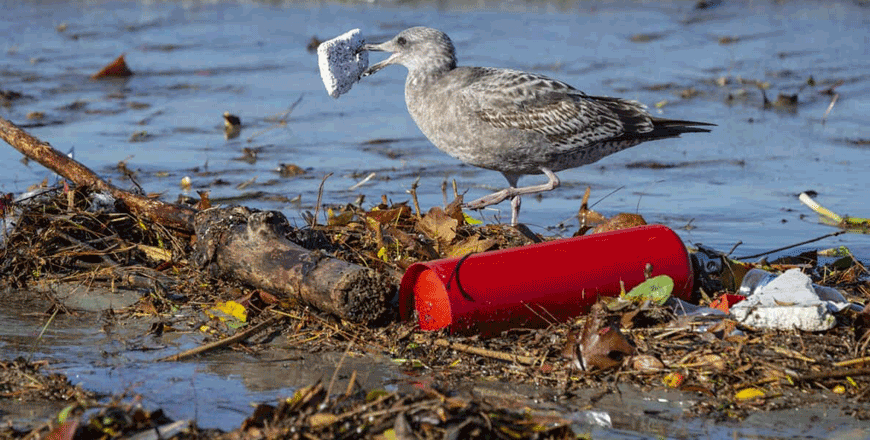You are here
Coming years ‘critical’ to slash plastic pollution — UN
By AFP - May 17,2023 - Last updated at May 17,2023
PARIS — The world must halve single-use plastics and slash throwaway consumption to stem the tide of environmental pollution, according to a UN report on Tuesday that warns the next few years are critical.
Concern is growing about the impacts of plastics, with microplastic fragments found from the deepest oceans trenches to the top of Mount Everest.
In humans, they have been detected in blood, breast milk and placentas.
The report by the United Nations Environment Programme (UNEP) comes two weeks before negotiators from nearly 200 countries meet in Paris for a new round of negotiations aimed at reaching a legal agreement next year to end plastic pollution.
It lays out a three-pronged plan based on reuse, recycling and diversifying the materials used — to help slash plastic pollution 80 per cent by 2040 overall and cut single-use plastic production by half.
The report cited research estimating plastic could emit 19 per cent of global greenhouse gas emissions by 2040.
That would essentially prevent the world from meeting its Paris Agreement commitment to limit the rise in the planet’s average surface temperature to 1.5ºC above the pre-industrial level.
“The way we produce, use and dispose of plastics is polluting ecosystems, creating risks for human health and de-stabilising the climate,” said Inger Andersen, UNEP executive director.
She said the roadmap laid out in the report “dramatically reduces these risks, through adopting a circular approach that keeps plastics out of ecosystems, out of our bodies and in the economy”.
In 2020, approximately 238 million metric tonnes (mmt) of waste from short-lived plastics — such as packaging that ends up in municipal waste — was generated worldwide.
Roughly half of that was mismanaged, mostly dumped in the environment or burned.
Without significant changes, UNEP expects annual plastic waste to reach 408mmt by 2040, including 380mmt of new fossil-fuel-based plastics. That would mean some 227mmt of plastics would end up in the environment.
The report estimates that with a range of “systems change” solutions, that pollution figure could be reduced to 41mmt.
But the report says there is no time to waste.
“The next three to five years present a critical window for action to set the world on the path towards implementing the systems change scenario by 2040,” it warned.
No longer ‘disposable’
Reuse — as opposed to recycling — was identified as the most effective measure, and would cut plastic pollution up to 30 per cent by 2040 with the introduction of things like refillable water bottles, packaging take-back schemes and “reverse vending machines”.
While governments have to incentivise the shift and retailers will need to make it easier to return packaging, consumers will also have to “forego convenience of disposable and get used to products looking less shiny”.
Better recycling could cut pollution by a fifth, the report found, thanks to policies including the removal of fossil fuel subsidies and the enforcement of design rules to make items easier to treat.
An additional 17 per cent cut would come from replacing plastics with alternatives, like paper or other compostable materials.
The remainder of the pollution cuts would be in better disposal of non-recyclable plastics, which UNEP said would need stronger design and safety standards, as well as rules making manufacturers responsible for products that shed microplastics for example.
The report estimates that while there would be significant costs to implementing such sweeping changes, these would be dwarfed by the economic benefits, including from reducing the impacts of pollution on health, climate, air pollution, marine ecosystem degradation.
But some campaigners said the report was not ambitious enough in so far as it assumes plastic use will continue at significant levels.
“They have tried to change a pipe, change the valves or whatever, but they are not trying to actually turn off the tap,” said Hirotaka Koite, of Greenpeace.
“They are not talking about reduction of the production.”
But he welcomed the report warnings against plastics falsely presented as “degradable, compostable”, as well as the support for the removal of fossil fuel subsidies, which makes it cheaper to make new plastic than to recycle.
Related Articles
HURGHADA, Egypt — Combing the Red Sea beach at an Egyptian luxury resort, workers find bagfuls of plastic garbage — but the news isn't all b
LONDON — When Ingrid Caldironi decided to start living a more eco-friendly lifestyle, she made a few changes to her routine.Caldironi bought
PARIS — Plastic pollution in the world’s oceans has reached “unprecedented levels” over the past 15 years, a recent study has found, calling


















